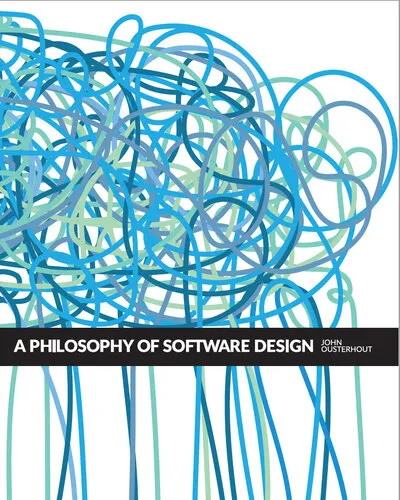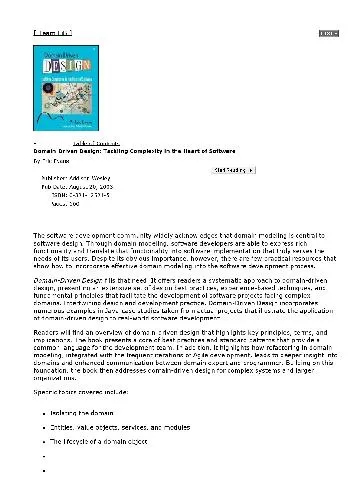A Philosophy of Software Design, 2nd Edition
4.0
بر اساس نظر کاربران

شما میتونید سوالاتتون در باره کتاب رو از هوش مصنوعیش بعد از ورود بپرسید
هر دانلود یا پرسش از هوش مصنوعی 2 امتیاز لازم دارد، برای بدست آوردن امتیاز رایگان، به صفحه ی راهنمای امتیازات سر بزنید و یک سری کار ارزشمند انجام بدینکتاب های مرتبط:
Persian Summary
معرفی کتاب 'A Philosophy of Software Design, 2nd Edition'
این کتاب ارزشمند به قلم John Ousterhout به بررسی عمیق فلسفه طراحی نرمافزار میپردازد و مفاهیم بنیادینی را که برای بهبود فرآیند توسعه نرمافزار ضروری هستند، تشریح میکند. در این کتاب، Ousterhout با نگاهی عملی و تجربی، تجربیات خود در زمینه توسعه نرمافزار را به اشتراک میگذارد و راهکاری کاربردی برای مدیریت و کاهش پیچیدگیهای نرمافزاری ارائه میدهد.
خلاصهای از کتاب
کتاب 'A Philosophy of Software Design' در هسته خود به بررسی اهمیت کاهش پیچیدگی در نرمافزارها میپردازد. Ousterhout معتقد است که بسیاری از مشکلات پیش روی مهندسان نرمافزار به دلیل وجود پیچیدگیهای غیرضروری است. این کتاب شامل تکنیکها و روشهایی برای طراحی نرمافزارهای قابل نگهداری و آسان برای درک است. نویسنده بر اهمیت درستنویسی و ساختاردهی صحیح کد تأکید دارد و به مهندسان نرمافزار نشان میدهد چگونه با استفاده از اصولی چون modularity، abstraction و encapsulation میتوانند نرمافزارهایی با کیفیت و مقیاسپذیری بالا توسعه دهند.
نکات کلیدی
- مدیریت و کاهش پیچیدگی: کتاب بر روی تمرینها و تکنیکهای مختلف برای کاهش پیچیدگی نرمافزار متمرکز است.
- اصل modularity: تشریح اهمیت تفکیک مناسب وظایف در نرمافزار و طراحی ماژولار.
- سادگی در طراحی: تاکید بر نگهداری سادگی در طراحی برای جلوگیری از پیچیدگی غیرضروری.
- اهمیت tests: معرفی نقش tests در شناسایی و کاهش پیچیدگی نرمافزار.
چند نقل قول معروف از کتاب
"Complexity is the primary enemy of quality software. The more complex the system, the harder it is to understand, change, and maintain."
"Abstraction is not about understanding the implementation details, it's about ignoring them."
چرا این کتاب اهمیت دارد
این کتاب نه تنها برای مهندسان نرمافزار مبتدی بلکه برای برنامهنویسان با تجربه نیز مهم است. اهمیت آن در این است که نگاه عمیقی به فرایند طراحی نرمافزار دارد و چالشهای رایج در این زمینه را مورد بحث قرار میدهد. با ارائه روشها و اصولی که به کاهش پیچیدگی کمک میکنند، این کتاب میتواند تاثیر بزرگی بر کیفیت نرمافزارهای توسعهیافته توسط تیمها داشته باشد. از این رو، این کتاب به عنوان منبعی کلیدی برای درک بهتر فلسفه و هنر طراحی نرمافزار در نظر گرفته شده است.
Introduction to "A Philosophy of Software Design, 2nd Edition"
"A Philosophy of Software Design, 2nd Edition" by John Ousterhout is an insightful and pragmatic guide that seeks to illuminate the complexities of software development. This book is an essential read for both novice programmers and seasoned developers seeking to deepen their understanding of software design and clean coding practices.
Detailed Summary of the Book
The second edition of "A Philosophy of Software Design" expands upon the original edition, delving deeper into the complexities of software design with added insights and examples. Ousterhout presents a clear philosophy that revolves around the simplicity in code and minimizing complexity. He articulates his philosophy with a blend of theoretical insights and practical advice, aimed at improving the overall design and readability of software.
The book explains that complexity is the root cause of most problems in software design. Ousterhout identifies two forms of complexity: 'accidental complexity,' which is introduced by the developers themselves, and 'essential complexity,' which is inherent to the problem being solved. Through a series of chapters, the book explores techniques to minimize complexity, including modular design, layering, and the concept of deep modules. By leveraging these techniques, the reader is equipped to write cleaner, more comprehensible code.
The book is not only theoretical but also highly practical, offering actionable advice on class design, error handling, and documentation. Ousterhout emphasizes the importance of consistency, simplicity, and mindfulness in crafting elegant solutions. With real-world examples and refactoring exercises, readers can practically apply the concepts as they advance through the book.
Key Takeaways
- Understanding the true cost of complexity and how it affects software maintainability.
- The importance of designing deep and abstract modules for simpler integration and modification.
- How to discern between essential and accidental complexity—and what to do about each.
- Strategic approaches to managing dependencies and creating consistent interfaces.
- Guidance on clear and concise error handling and documentation practices.
Famous Quotes from the Book
"The greatest challenge facing software engineers is managing complexity."
"A complex system that works is invariably found to have evolved from a simple system that worked."
"Design your modules so that they hide complexity."
Why This Book Matters
In the fast-paced and ever-evolving world of technology, codebases rapidly accumulate complexity, which can lead to inefficiencies and bugs. "A Philosophy of Software Design, 2nd Edition" is pivotal because it addresses this fundamental issue. Ousterhout's book offers visionary insights and practical methodologies that advocate for simplicity and clarity in software design.
Beyond its immediate practical benefits, the book also fosters a mindset change in how developers approach coding problems. By internalizing the principles proposed by Ousterhout, software engineers are better equipped to construct architectures that are not only functional but also scalable, robust, and easier to maintain. This shift contributes significantly to a developer's professional growth and the advancement of software engineering as a discipline.
Ultimately, this book is an indispensable resource for anyone serious about becoming a proficient software designer, offering timeless wisdom in an engaging and educational format.
دانلود رایگان مستقیم
شما میتونید سوالاتتون در باره کتاب رو از هوش مصنوعیش بعد از ورود بپرسید
دسترسی به کتابها از طریق پلتفرمهای قانونی و کتابخانههای عمومی نه تنها از حقوق نویسندگان و ناشران حمایت میکند، بلکه به پایداری فرهنگ کتابخوانی نیز کمک میرساند. پیش از دانلود، لحظهای به بررسی این گزینهها فکر کنید.
این کتاب رو در پلتفرم های دیگه ببینید
WorldCat به شما کمک میکنه تا کتاب ها رو در کتابخانه های سراسر دنیا پیدا کنید
امتیازها، نظرات تخصصی و صحبت ها درباره کتاب را در Goodreads ببینید
کتابهای کمیاب یا دست دوم را در AbeBooks پیدا کنید و بخرید
1907
بازدید4.0
امتیاز0
نظر98%
رضایتنظرات:
4.0
بر اساس 0 نظر کاربران
Questions & Answers
Ask questions about this book or help others by answering
No questions yet. Be the first to ask!















